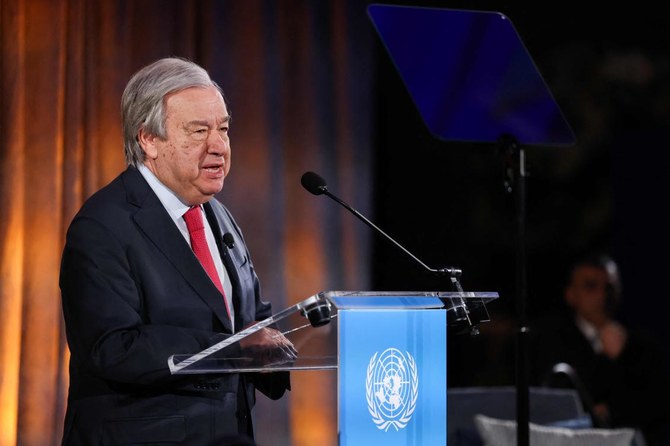BRUSSELS/GENEVA: Each of the past 12 months ranked as the warmest on record in year-on-year comparisons, the EU’s climate change monitoring service said on Wednesday, as UN Secretary-General António Guterres called for urgent action to avert “climate hell.”
The average global temperature for the 12-month period to the end of May was 1.63 degrees Celsius (2.9 degrees Fahrenheit) above the pre-industrial average — making it the warmest such period since record-keeping began in 1940, the Copernicus Climate Change Service said.
This 12-month average does not mean that the world has yet surpassed the 1.5 C (2.7 F) global warming threshold, which describes a temperature average over decades, beyond which scientists warn of more extreme and irreversible impacts.

In a separate report, the UN’s World Meteorological Organization (WMO) said there is now an 80 percent chance that at least one of the next five years will mark the first calendar year with an average temperature that temporarily exceeds 1.5C above pre-industrial levels — up from a 66 percent chance last year.
Speaking about the findings, UN Secretary-General António Guterres emphasized how quickly the world was heading in the wrong direction and away from stabilizing its climate system.
“In 2015, the chance of such a breach was near zero,” Guterres said in a speech marking World Environment Day.
With time running out to reverse course, Guterres urged a 30 percent cut in global fossil fuel production and use by 2030.
“We need an exit ramp off the highway to climate hell,” he said, adding: “The battle for 1.5 degrees will be won or lost in the 2020s.”
’WAY OFF TRACK’
Carbon dioxide emissions from burning fossil fuels — the main cause of climate change — hit a record high last year despite global agreements designed to curb their release and a rapid expansion in renewable energy.
Coal, oil and gas still provide more than three quarters of the world’s energy, with global oil demand remaining strong.
The latest climate data show that the world is “way off track” from its goal of limiting warming to 1.5 C — the key target of the world’s 2015 Paris Accord, WMO Deputy Secretary-General Ko Barrett said.
“We must urgently do more to cut greenhouse gas emissions, or we will pay an increasingly heavy price in terms of trillions of dollars in economic costs, millions of lives affected by more extreme weather, and extensive damage to the environment and biodiversity,” Barrett said.
Barrett described the cooling effect of La Nina weather conditions, which are expected to take hold later this year, as “a mere blip in the upward curve” in the heat felt across the globe.
“We all need to know that we need to reverse this curve and we need to do it urgently,” she said.
While last year registered as the warmest calendar year on record at 1.45 C (2.61 F) above pre-industrial temperatures, at least one of the next five years is likely to be even warmer than 2023, the WMO data show.
Scientists at Copernicus said there were some surprising developments — such as the steep loss of Antarctic sea ice in recent months — but that the overall climate data were in line with projections of how rising greenhouse gas emissions would heat the planet.
“We have not seen anything like this in the last several thousand years,” said Copernicus Director Carlo Buontempo.
Guterres took aim at fossil fuel companies.
“The Godfathers of climate chaos – the fossil fuel industry – rake in record profits and feast off trillions in taxpayer-funded subsidies,” he said.
Drawing a comparison with many governments’ restrictions on advertising for harmful substances like tobacco, he said, “I urge every country to ban advertising from fossil fuel companies, and I urge news media and tech companies to stop taking fossil fuel advertising.”




















